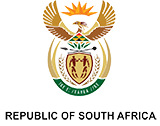Dear Fellow South African,
There are few presidential activities more fulfilling than spending a morning in the company of small children. Last week, I attended the opening of the Little Flower early childhood development (ECD) centre in Bizana in the Eastern Cape, where I got to spend time with some of the future leaders of our country, reading to them and listening to them.
President @CyrilRamaphosa officially opening the newly constructed Little Flower Early Childhood Development Centre in Nkantolo, Winnie Madikizela-Mandela Local Municipality in the Eastern Cape. pic.twitter.com/1ZdAgZOn6I
— Presidency | South Africa 🇿🇦 (@PresidencyZA) October 5, 2022
The centre was recently built by the development organisation Impande South Africa through the support of the Nelson Mandela Foundation.
I was deeply touched by the dedication of the centre’s staff to supporting the community and its children. They told me how in the centre’s earliest days, staff struggled to get paid and yet still came to work. They also told me that even if families are not able to pay the R20 fee for their child, the children are not turned away.
The commitment of the ECD centre staff is so important because early childhood development centres play a pivotal role in our nation’s development. These centres can be found in every village, town and city in the country. Most were started by women in the community to support parents who need their children to be cared for when they are at work. Many of these centres began as creches and day-care facilities. Many have subsequently grown and expanded to incorporate a basic learning curriculum into their services.

As government, we have taken up the task to improve the standards of care and make resources available for ECD centres to run suitable activities for young children to prepare them for formal education. In April this year, we completed the move of the ECD function from the Department of Social Development to the Department of Basic Education. This is to link early childhood development to the formal school curriculum and to provide training, education and development to staff in ECD centres around the country.
Because this foundational learning is key to a child’s success in later years, the Basic Education Laws Amendment Bill that is currently before Parliament proposes that it be compulsory for all children to receive two years of ECD before they enter Grade 1. It is at this stage that children should be taught, learn through play and receive at least one meal a day.
Early childhood development centres don’t just prepare our country’s youngest citizens to succeed in school; they are also an important source of entrepreneurship and job creation. These centres are an important part of the care economy. They sustain livelihoods, especially for women, which contributes to job creation in many communities.
When the COVID-19 pandemic struck, ECD centres were hard hit. Facilities that rely on school fees to keep running were unable to pay their staff and many parents who lost their jobs were unable to keep their children enrolled.
In response, government established the ECD Employment Stimulus Relief Fund to help ECD centres that had lost income as a result of the pandemic and to enable them to recover.
Preparing our youngest citizens with the tools they need to succeed in life is a responsibility we must collectively shoulder. We must continue to do all we can, as government, the private sector and development organisations, to support early childhood development.
With the many valuable services it provides, whether it is educating our children, providing childcare for working parents or creating opportunities for entrepreneurs, ECD makes a huge contribution to the achievement of many of our developmental goals.
Since the care economy is mainly driven by women, such support goes a long way towards helping women, especially in disadvantaged communities, to become financially secure and independent.

The young children in these centres are the next generation of South Africans who must be able to live up to their full potential as responsible, capable and outstanding citizens.
They must be able to pursue their dreams so that we all may achieve our shared dream of a free, prosperous and happy nation.
With best regards,

- Tags:
- Education /
- Youth /
- Early learning /
- Early Childhood Development /
- Schools /
- Basic education
Tweet


